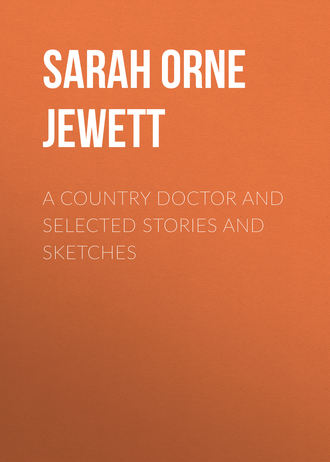 полная версия
полная версияA Country Doctor and Selected Stories and Sketches
"But I haven't needed anything," she said, giving Captain Walter a grateful glance for his championship. "And Mr. Gerry is very kind and attentive to my aunt, so I am glad she has been generous to him. He seems a fine fellow, as you say," and Nan thought suddenly that it was very hard for him to have had her appear on the scene by way of rival, if he had been led to suppose that he was her aunt's heir. There were so many new things to think of, that Nan had a bewildering sense of being a stranger and a foreigner in this curiously self-centred Dunport, and a most disturbing element to its peace of mind. She wondered if, since she had not grown up here, it would not have been better to have stayed away altogether. Her own life had always been quite unvexed by any sort of social complications, and she thought how good it would be to leave this talkative and staring little world and go back to Oldfields and its familiar interests and associations. But Dunport was a dear old place, and the warm-hearted captain a most entertaining guide, and by the time their walk was over, the day seemed a most prosperous and entertaining one. Aunt Nancy appeared to be much pleased with the plan for the afternoon, and announced that she had asked some of the young people to come to drink tea the next evening, while she greeted Nan so kindly that the home-coming was particularly pleasant. As for the captain, he was unmistakably happy, and went off down the street with a gentle, rolling gait, and a smile upon his face that fairly matched the June weather, though he was more than an hour late for the little refreshment with which he and certain dignified associates commonly provided themselves at eleven o'clock in the forenoon. Life was as regular ashore as on board ship with these idle mariners of high degree. There was no definite business among them except that of occasionally settling an estate, and the forming of decided opinions upon important questions of the past and future.
The shadows had begun to grow long when the merry company of young people went up river with the tide, and Nan thought she had seldom known such a pleasure away from her own home. She begged for the oars, and kept stroke with George Gerry, pulling so well that they quickly passed the other boat. Mary Parish and the friend who made the fourth of that division of the party sat in the stern and steered with fine dexterity, and the two boats kept near each other, so that Nan soon lost all feeling of strangeness, and shared in the good comradeship to which she had been willingly admitted. It was some time since she had been on the water before, and she thought more than once of her paddling about the river in her childhood, and even regaled the company once with a most amusing mishap, at the remembrance of which she had been forced to laugh outright. The river was broad and brimful of water; it seemed high tide already, and the boats pulled easily. The fields sloped down to the river-banks, shaded with elms and parted by hedgerows like a bit of English country. The freshest bloom of the June greenness was in every blade of grass and every leaf. The birds were beginning to sing the long day to a close, and the lowing of cattle echoed from the pastures again and again across the water; while the country boats were going home from the town, sometimes with a crew of women, who seemed to have made this their regular conveyance instead of following the more roundabout highways ashore. Some of these navigators rowed with a cross-handed stroke that jerked their boats along in a droll fashion, and some were propelled by one groping oar, the sculler standing at the stern as if he were trying to push his craft out of water altogether and take to the air, toward which the lifted bow pointed. And in one of the river reaches half a mile ahead, two heavy packet boats, with high-peaked lateen sails, like a great bird's single wing, were making all the speed they could toward port before the tide should begin to fall two hours later. The young guest of the party was very happy; she had spent so many of her childish days out of doors that a return to such pleasures always filled her with strange delight. The color was bright in her cheeks, and her half-forgotten girlishness came back in the place of the gravity and dignity that had brought of late a sedate young womanliness to her manner. The two new friends in the stern of the boat were greatly attracted to her, and merry laughter rang out now and then. Nan was so brave and handsome, so willing to be pleased, and so grateful to them for this little festivity, that they quickly became interested in each other, as girls will. The commander thought himself a fortunate fellow, and took every chance of turning his head to catch a glimpse of our heroine, though he always had a good excuse of taking his bearings or inspecting for himself some object afloat or ashore which one of the boat's company had pointed out. And Nan must be told the names of the distant hills which stood out clear in the afternoon light, and to what towns up river the packet boats were bound, and so the time seemed short before the light dory was run in among the coarse river grass and pulled up higher than seemed necessary upon the shore.
Their companions had not chosen so fleet a craft, and were five instead of four at any rate, but they were welcomed somewhat derisively, and all chattered together in a little crowd for a few minutes before they started for a bit of woodland which overhung the river on a high point. The wind rustled the oak leaves and roughened the surface of the water, which spread out into a wide inland bay. The clouds began to gather in the west and to take on wonderful colors, as if such a day must be ended with a grand ceremony, and the sun go down through banners and gay parades of all the forces of the sky. Nan had watched such sunsets from her favorite playground at the farm, and somehow the memory of those days touched her heart more tenderly than they had ever done before, and she wished for a moment that she could get away from the noisy little flock who were busy getting the supper ready, though they said eagerly what a beautiful evening it would be to go back to town, and that they must go far up the river first to meet the moonlight.
In a few minutes Nan heard some one say that water must be brought from a farm-house not far away, and quickly insisted that she should make one of the messengers, and after much discussion and remonstrance, she and young Gerry found themselves crossing the open field together. The girl had left her hat swinging from one of the low oak branches; she wondered why Mary Parish had looked at her first as if she were very fond of her, and then almost appealingly, until the remembrance of Captain Walter's bit of gossip came to mind too late to be acted upon. Nan felt a sudden sympathy, and was sorry she had not thought to share with this favorite among her new friends, the companion whom she had joined so carelessly. George Gerry had some very attractive ways. He did not trouble Nan with unnecessary attentions, as some young men had, and she told herself again, how much she liked him. They walked fast, with free, light steps, and talked as they went in a way that was very pleasant to both of them. Nan was wise to a marvel, the good fellow told himself, and yet such an amusing person. He did not know when he had liked anybody so much; he was very glad to stand well in the sight of these sweet, clear eyes, and could not help telling their owner some of the things that lay very near his heart. He had wished to get away from Dunport; he had not room there; everybody knew him as well as they knew the courthouse; he somehow wanted to get to deeper water, and out of his depth, and then swim for it with the rest. And Nan listened with deep sympathy, for she also had felt that a great engine of strength and ambition was at work with her in her plans and studies.
She waited until he should have finished his confidence, to say a word from her own experience, but just then they reached the farm-house and stood together at the low door. There was a meagre show of flowers in the little garden, which the dripping eaves had beaten and troubled in the late rains, and one rosebush was loosely caught to the clapboards here and there.
There did not seem to be anybody in the kitchen, into which they could look through the open doorway, though they could hear steps and voices from some part of the house beyond it; and it was not until they had knocked again loudly that a woman came to answer them, looking worried and pale.
"I never was so glad to see folks, though I don't know who you be," she said hurriedly. "I believe I shall have to ask you to go for help. My man's got hurt; he managed to get home, but he's broke his shoulder, or any ways 'tis out o' place. He was to the pasture, and we've got some young cattle, and somehow or 'nother one he'd caught and was meaning to lead home give a jump, and John lost his balance; he says he can't see how 't should 'a' happened, but over he went and got jammed against a rock before he could let go o' the rope he'd put round the critter's neck. He's in dreadful pain so 't I couldn't leave him, and there's nobody but me an' the baby. You'll have to go to the next house and ask them to send; Doctor Bent's always attended of us."
"Let me see him," said Nan with decision. "Wait a minute, Mr. Gerry, or perhaps you had better come in too," and she led the way, while the surprised young man and the mistress of the house followed her. The patient was a strong young fellow, who sat on the edge of the bed in the little kitchen-bedroom, pale as ashes, and holding one elbow with a look of complete misery, though he stopped his groans as the strangers came in.
"Lord bless you, young man! don't wait here," he said; "tell the doctor it may only be out o' place, but I feel as if 'twas broke."
But Nan had taken a pair of scissors from the high mantelpiece and was making a cut in the coarse, white shirt, which was already torn and stained by its contact with the ground, and with quick fingers and a look of deep interest made herself sure what had happened, when she stood still for a minute and seemed a little anxious, and all at once entirely determined. "Just lie down on the floor a minute," she said, and the patient with some exclamations, but no objections, obeyed.
Nan pushed the spectators into the doorway of the kitchen, and quickly stooped and unbuttoned her right boot, and then planted her foot on the damaged shoulder and caught up the hand and gave a quick pull, the secret of which nobody understood; but there was an unpleasant cluck as the bone went back into its socket, and a yell from the sufferer, who scrambled to his feet.
"I'll be hanged if she ain't set it," he said, looking quite weak and very much astonished. "You're the smartest young woman I ever see. I shall have to lay down just to pull my wits together. Marthy, a drink of water," and by the time this was brought the excitement seemed to be at an end, though the patient was a little faint, and his wife looked at Nan admiringly. Nan herself was fastening her boot again with unwonted composure. George Gerry had not a word to say, and listened to a simple direction of Nan's as if it were meant for him, and acceded to her remark that she was glad for the shoulder's sake that it did not have to wait and grow worse and worse all the while the doctor was being brought from town. And after a few minutes, when the volley of thanks and compliments could be politely cut short, the two members of the picnic party set forth with their pail of water to join their companions.
"Will you be so good as to tell me how you knew enough to do that?" asked Mr. Gerry humbly, and looking at his companion with admiration. "I should not have had the least idea."
"I was very glad it turned out so well," said Nan simply. "It was a great pleasure to be of use, they were so frightened, poor things. We won't say anything about it, will we?"
But the young man did not like to think yet of the noise the returning bone had made. He was stout-hearted enough usually; as brave a fellow as one could wish to see; but he felt weak and womanish, and somehow wished it had been he who could play the doctor. Nan hurried back bareheaded to the oak grove as if nothing had happened, though, if possible, she looked gayer and brighter than ever. And when the waiting party scolded a little at their slow pace, Miss Prince was much amused and made two or three laughing apologies for their laziness, and even ventured to give the information that they had made a pleasant call at the farm-house.
The clouds were fading fast and the twilight began to gather under the trees before they were ready to go away, and then the high tide had floated off one of the boats, which must be chased and brought back. But presently the picnickers embarked, and, as the moon came up, and the river ebbed, the boats went back to the town and overtook others on the way, and then were pulled up stream again in the favoring eddy to make the evening's pleasure longer; at last Nan was left at her door. She had managed that George Gerry should give Mary Parish his arm, and told them, as they came up the street with her from the wharf, that she had heard their voices Saturday night as they passed under her window: it was Mary Parish herself who had talked about the best room and its ghosts.
XVIII
A SERIOUS TEA-DRINKING
It was very good for Nan to find herself cordially welcomed to a company of young people who had little thought of anything but amusement in the pleasant summer weather. Other young guests came to Dunport just then, and the hospitable town seemed to give itself up to their entertainment. Picnics and tea-drinkings followed each other, and the pleasure boats went up river and down river, while there were walks and rides and drives, and all manner of contrivances and excuses for spending much time together on the part of the young men and maidens. It was a good while since Nan had taken such a long holiday, though she had by no means been without the pleasures of society. Not only had she made friends easily during her school-life and her later studies, but Oldfields itself, like all such good old nests, was apt to call back its wandering fledglings when the June weather came. It delighted her more and more to be in Dunport, and though she sometimes grew impatient, wise Dr. Leslie insisted that she must not hurry home. The change was the very best thing in the world for her. Dr. Ferris had alighted for a day or two in the course of one of his wandering flights; and it seemed to the girl that since everything was getting on so well without her in Oldfields, she had better, as the doctor had already expressed it, let her visit run its course like a fever. At any rate she could not come again very soon, and since her aunt seemed so happy, it was a pity to hurry away and end these days sooner than need be. It had been a charming surprise to find herself such a desired companion, and again and again quite the queen of that little court of frolickers, because lately she had felt like one who looks on at such things, and cannot make part of them. Yet all the time that she was playing she thought of her work with growing satisfaction. By other people the knowledge of her having studied medicine was not very well received. It was considered to have been the fault of Miss Prince, who should not have allowed a whimsical country doctor to have beguiled the girl into such silly notions, and many were the shafts sped toward so unwise an aunt for holding out against her niece so many years. To be sure the child had been placed under a most restricted guardianship; but years ago, it was thought, the matter might have been rearranged, and Nan brought to Dunport. It certainly had been much better for her that she had grown up elsewhere; though, for whatever was amiss and willful in her ways, Oldfields was held accountable. It must be confessed that every one who had known her well had discovered sooner or later the untamed wildnesses which seemed like the tangles which one often sees in field-corners, though a most orderly crop is taking up the best part of the room between the fences. Yet she was hard to find fault with, except by very shortsighted persons who resented the least departure by others from the code they themselves had been pleased to authorize, and who could not understand that a nature like Nan's must and could make and keep certain laws of its own.
There seemed to be a sort of inevitableness about the visit; Nan herself hardly knew why she was drifting on day after day without reasonable excuse. Her time had been most carefully ordered and spent during the last few years, and now she sometimes had an uneasy feeling and a lack of confidence in her own steadfastness. But everybody took it for granted that the visit must not come to an end. The doctor showed no sign of expecting her. Miss Prince would be sure to resent her going away, and the pleasure-makers marked one day after another for their own. It seemed impossible, and perhaps unwise, to go on with the reading she had planned, and, in fact, she had been urged to attend to her books rather by habit than natural inclination; and when the temptation to drift with the stream first made itself felt, the reasons for opposing it seemed to fade away. It was easier to remember that Dr. Leslie, and even those teachers who knew her best at the medical school, had advised a long vacation.
The first formal visits and entertainments were over with for the most part, and many of the Dunport acquaintances began to seem like old friends. There had been a little joking about Nan's profession, and also some serious remonstrance and unwise championship which did not reach this heroine's ears. It all seemed romantic and most unusual when anybody talked about her story at all, and the conclusion was soon reached that all such whims and extravagances were merely incident to the pre-Dunportian existence, and that now the young guest had come to her own, the responsibilities and larger field of activity would have their influence over her plan of life. The girl herself was disposed to talk very little about this singular fancy; it may have been thought that she had grown ashamed of it as seen by a brighter light, but the truth was it kept a place too near her heart to allow her to gossip with people who had no real sympathy, and who would ask questions from curiosity alone. Miss Eunice Fraley had taken more than one opportunity, however, to confess her interest, though she did this with the manner of one who dares to be a conspirator against public opinion, and possibly the permanent welfare of society, and had avowed, beside, her own horror of a doctor's simplest duties. But poor Miss Fraley looked at her young friend as a caged bird at a window might watch a lark's flight, and was strangely glad whenever there was a chance to spend an hour in Nan's company.
The first evening at Mrs. Fraley's had been a great success, and Miss Prince had been vastly pleased because both the hostess and the guest had received each other's commendation. Mrs. Fraley was, perhaps, the one person whom Miss Prince recognized as a superior officer, and she observed Nan's unconscious and suitable good behavior with great pride. The hostess had formerly been an undisputed ruler of the highest social circles of Dunport society, and now in her old age, when she could no longer be present at any public occasions, she was still the queen of a little court that assembled in her own house. It was true that the list of her subjects grew shorter year by year, but the survivors remained loyal, and hardly expected, or even desired, that any of the newcomers to the town should recognize their ruler. Nan had been much interested in the old lady's stories, and had gladly accepted an invitation to come often to renew the first conversation. She was able to give Mrs. Fraley much welcome information of the ways and fashions of other centres of civilization, and it was a good thing to make the hours seem shorter. The poor old lady had few alleviations; even religion had served her rather as a basis for argument than an accepted reliance and guide; and though she still prided herself on her selection of words, those which she used in formal conversations with the clergyman seemed more empty and meaningless than most others. Mrs. Fraley was leaving this world reluctantly; she had been well fitted by nature for social preeminence, and had never been half satisfied with the opportunities provided for the exercise of her powers. It was only lately that she had been forced to acknowledge that Time showed signs of defeating her in the projects of her life, and she had begun to give up the fight altogether, and to mourn bitterly and aggressively to her anxious and resourceless daughter. It was plain enough that the dissatisfactions and infirmities of age were more than usually great, and poor Eunice was only too glad when the younger Miss Prince proved herself capable of interesting the old friend of her family, and Mrs. Fraley took heart and suggested both informal visits and future entertainments. The prudent daughter was careful not to tell her mother of the guest's revolutionary ideas, and for a time all went well, until some unwise person, unaware of Miss Fraley's warning gestures from the other side of the sitting-room, proceeded to give a totally unnecessary opinion of the propriety of women's studying medicine. Poor Eunice expected that a sharp rebuke, followed by a day or two's disdain and general unpleasantness, would descend upon her quaking shoulders; but, to her surprise, nothing was said until the next morning, when she was bidden, at much inconvenience to the household, to invite Miss Prince and her niece to come that afternoon to drink tea quite informally.
There was a pathetic look in the messenger's faded face,—she felt unusually at odds with fortune as she glided along the street, sheltered by the narrow shadows of the high fences. Nan herself came to the door, and when she threw back the closed blinds and discovered the visitor, she drew her in with most cordial welcome, and the two friends entered the darkened south parlor, where it was cool, and sweet with the fragrance of some honeysuckle which Nan had brought in early that morning from the garden.
"Dear me," said the little woman deprecatingly. "I don't know why I came in at all. I can't stop to make a call. Mother was very desirous that you and your aunt should come over to tea this evening. It seems a good deal to ask in such hot weather, but she has so little to amuse her, and I really don't see that the weather makes much difference, she used to feel the heat very much years ago." And Miss Eunice gave a sigh, and fanned herself slowly, letting the fan which had been put into her hand turn itself quite over on her lap before it came up again. There was an air of antique elegance about this which amused Nan, who stood by the table wiping with her handkerchief some water that had dropped from the vase. A great many of the ladies in church the Sunday before had fanned themselves in this same little languishing way; she remembered one or two funny old persons in Oldfields who gave themselves airs after the same fashion.
"I think we shall both be very pleased," she answered directly, with a bit of a smile; while Miss Fraley gazed at her admiringly, and thought she had never seen the girl look so fresh and fair as she did in this plain, cool little dress. There had been more water than was at first suspected; the handkerchief was a limp, white handful, and they both laughed as it was held up. Miss Fraley insisted that she could not stay. She must go to the shops to do some errands, and hoped to meet Miss Prince who had gone that way half an hour before.
"Don't mind anything mother may say to you," she entreated, after lingering a minute, and looking imploringly in Nan's face. "You know we can't expect a person of her age to look at everything just as we do."
"Am I to be scolded?" asked Nan, serenely. "Do you know what it is about?"
"Oh, perhaps nothing," answered Miss Fraley, quickly. "I ought not to have spoken, only I fancied she was a little distressed at the idea of your being interested in medicines. I don't know anything that is more useful myself. I am sure every family needs to have some one who has some knowledge of such things; it saves calling a doctor. My sister Susan knows more than any of us, and it has been very useful to her with her large family."
"But I shouldn't be afraid to come, I think," said Nan, laughing. "Mrs. Fraley told me that she would finish that story of the diamond ring, you know, and we shall get on capitally. Really I think her stories of old times are wonderfully interesting. I wish I had a gift for writing them down whenever I am listening to her."






